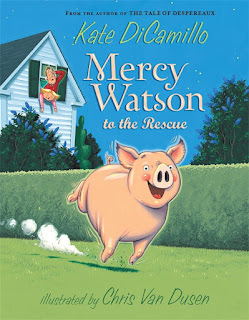 |
| http://www.mercywatson.com/http://www.mercywatson.com/ |
This is the story of a student in my class, we will call him Nathan. Nathan reads below grade level and receives academic support services for both reading and math. In September Nathan struggled to complete the reading survey that I gave to my third grade class. Even when I read many of the questions to him he was confused-he didn't know himself as a reader. He worked hard to answer questions, but the survey was handed in incomplete. He readily admitted he didn't like to read, or "sort of" liked to read. But this is not why I am writing this post.
Early in September Nathan found the Mercy Watson series of books in our class library. I would like to say that I introduced this wonderful basket of books to him, but most likely I did not, because Mercy Watson books are considered too difficult for him according to his benchmark reading level. Having said that, I rarely, if ever, tell a student No, they can't put a book in their reading box. I do however help them navigate the book selection process - some students need more guidance than others. Choice is the key element to my reading workshop. Students chose the books that go into their book baskets, but they must be a good fit book, one they can read independently. (Students are free to read any book during our Free Choice reading time.) This is where the story really begins - during "shopping time", when students in my class select good-fit books from our class library to put in their personal book baskets for independent reading. Nathan asked to put a Mercy Watson book in his basket and I said yes. I prepared myself mentally to have some other book choices ready for him when we met later to read Mercy Watson. I felt fairly confident that Nathan would struggle and decide to choose a different book. But Nathan proved me wrong.
As I conferred with Nathan he stumbled over word after word, often reading nonsense words and he lacked fluency. I dutifully continued with our conference and taught him a decoding strategy that he readily applied. Of course he was struggling and this book definitely wasn't a good fit, but I knew he wasn't ready to let go of this book. I asked, "Do you think this book is a good-fit, just-right book for you?" He replied, "I think so." I realized he had probably never experienced reading a book that was on his independent reading level! No matter how many lessons I had done on choosing a just-right book he couldn't relate...yet. So the book stayed in his basket. I made sure there were other books that were a better fit, just in case. I made a note to meet with him again soon.
Every time I met with Nathan I thought, "this will be the day" he figures out Mercy Watson is too hard for him. But each day we met he kept rereading that Mercy Watson book and practicing the strategies that I showed him. He had even began collecting the tricky word on post it notes so that he could practice and show me them later. Before long he was discussing the content of the book with me. It was clear his comprehension was sound and he really liked the story! Then a few more amazing things happened.
During shopping time and free read time I observed Nathan chatting up Mercy Watson with fellow classmates and even taking them to where the basket of books was located. Other students started to check out Mercy Watson books. Nathan even told the AIS Math teacher who pushes into our room about Mercy Watson! One day he showed me a page in the book that had a picture of all the books in the series and said he was looking for two that were missing. After asking classmates it was clear that 2 of the books had gone missing. (Yeah, this happens sometimes...a book finds a new home.) He wrote the titles down on a post it note and asked if I could get them for the library.
So what can we learn from this story? Choice matters. Time to practice reading matters. Students are individuals, not levels. All the data we collect on them should be used to help us help them! And most of all, we are teaching children to read and write so that they can read for enjoyment, connect with other humans, and learn about the world - we are NOT teaching them to to read and write so they pass a test. I know this. I believe this. I try to remember this ever day in my class.
It's October and Nathan is still a below grade reader. That's okay. He's a reader now. And he knows what he likes to read, and he can't wait to tell you.
By the way...those missing Mercy Watson books...I ordered a new set and they came in the mail today. I can't wait to hand them to Nathan on Monday morning.
No comments:
Post a Comment